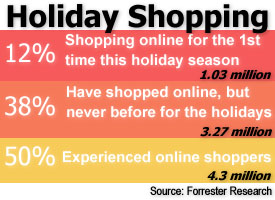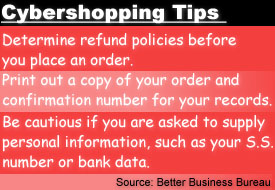|
Cyber-shop till you drop
|
 |
October 27, 1999: 6:19 a.m. ET
Net retailers offer convenience, savings, but beware of fraud, hidden costs
By Staff Writer Nicole Jacoby
|
NEW YORK (CNNfn) - Hardly a holiday season has passed in recent years without new predictions about how the Internet would revolutionize shopping and how Americans were destined to abandon malls in favor of their computer keyboards.
But this holiday season, the hype may become reality. Consumers are expected to spend $4 billion online between Thanksgiving and New Year's Eve -- almost three times the amount of last year, according to Internet research firm Forrester Research.
This may also be the year you join the throngs. About one million consumers will be shopping online for the first time this holiday season, with another 3.27 million using Internet retailers for the purpose of holiday shopping for the first time. The other 4 million will be Net veterans, having used the World Wide Web for holiday-giving in seasons past.

Convenience is consistently cited as the primary reason consumers get online and there is little dispute that the Internet has made price comparisons and bargain hunting easier than ever.
But before you gear up to point, click and shop, beware that convenience may come at a price -- and with risks -- albeit ones that may be worth your while.
Convenience galore
Few can argue with the assertion that online retailing has made shopping more convenient than ever. Information is easy to find and comparing prices from different sellers takes minutes.
The Internet has also simplified the process of choosing that perfect present, as online gift registries, which allow consumers to create holiday wish lists, become ever more prevalent.
And of course, the World Wide Web has virtually shrunk the real world, bringing once inaccessible and geographically challenged products to consumers' fingerprints.
"It can be a great way to find something that might not be readily available in your area," said Susan Grant, vice president for public policy at the National Consumers League and director of the organization's Internet Fraud Watch program. "Maybe you'll run across an out-of-print book or something you couldn't find anywhere else."
Online retailers can also offer savings, though how significant these bargains are is a bit unclear. Although many retailers, such as Amazon.com (AMZN), offer items at prices well below their brick-and-mortar counterparts, shipping and handling costs can cancel these out.
On the flip side, shipping fees may be a pittance compared to money laid out for gas, parking and the time spent in a real-world store hunting down the right gift.
"It really depends on what the consumer values," said Holly Cherico, spokeswoman for the Better Business Bureau. "Maybe the cost of getting in your car and the time spent walking exceeds that of shipping and handling."
Proceed with caution
Despite all its conveniences, the Internet does not eliminate many of the age-old problems that commonly plague consumers, especially when it comes to direct mail orders.
For one, there is no guarantee you will be satisfied with your purchase once it arrives. That red sweater you ordered might be more orange than you expected. Or maybe your boyfriend quit smoking cigars, making that humidor -- well -- excessive.
And unless the item was clearly defective or misrepresented, you may be stuck with it -- or at least with some added expense.
"Whether you want to return the item because you changed your mind or because someone didn't like it, there may be some cost to you," said Grant.
In most cases, you will be responsible for the cost of mailing the item back to the retailer. And don't assume because the online retailer has a real-world counterpart that you will be able to return the item at the brick-and-mortar store.

"People really need to guard against making assumptions," said Grant. "They really need to look at what information is spelled out and if they have unanswered questions, they need to get them answered."
Some Internet companies may not allow returns at all, for instance, and others may only issue store credit, which could be a problem if their products are very specialized and you won't have use for anything else they sell.
Just be clear about any return and refund policies before you make a purchase online and leave a paper trail by printing out product descriptions, delivery information, warranties and any confirmation notices. You'll also want to make sure you know how to reach the customer service department if you have any problems.
Charging ahead online
The good news is that the same laws that govern mail and phone orders apply to online retailers, so if you do find yourself in a situation where the company misrepresented its products or sent you a defective item, you have recourse.
Despite widespread assumptions to the contrary, the best way to protect yourself from these types of problems on the Internet is by charging any purchases you make.
Online credit card transactions "are protected by the Fair Billing Act, the same as phone and mail order transactions," the BBB's Cherico said. "If a company doesn't provide the promised product, they'll have to pay up."
By using a credit card, you have the legal right to dispute any problems and you have limited liability if your card number is stolen or misused. These same protections are not guaranteed by debit cards, though some debit companies voluntarily offer similar protection. If you pay by check or money order, your money may be much harder to recoup.
Regardless of how you pay, online orders are required by law to be delivered by the time stated -- or, if no time period is stated, within thirty days. But of course, it is easier to put a stop on payments for late items if you paid by credit card.
Be aware that many Internet retailers were caught off-guard by the surge in online purchases last holiday season, in some cases running out of inventory. It may be a good idea to place your order as far in advance as possible to avoid potential mishaps, though established retailers should be better prepared this year.
Misperceived risks
Despite the protection offered by credit cards, online payments still leave many consumers uneasy. In a survey commissioned by the National Consumers League, 41 percent of respondents cited concerns that their credit card numbers would be stolen if they gave them online.
That danger is often overstated, says the NCL's Grant.
Many consumers "incorrectly believe that it is safer to pay for an online purchase by check or money order rather than credit card," she said. "People don't realize that encryption is commonly used to protect financial information during transmission."
If you are unsure if your transaction is encrypted, look for the unbroken key or closed lock at the bottom of your browser window. When submitting sensitive data, the lock should be shut.
If you remain nervous about using your card online, consider calling in the number over a customer service line. Or use an escrow service, which will hold your money until you have confirmed you have received the product or service and then release the payment.
But bear in mind that the risks of submitting credit card information over the Internet are not all that different than providing it in the real world, says the BBB's Cherico.
"When you pay for a meal in a restaurant and the waiter takes your credit card behind the scenes, you can't really know that he isn't passing it along to his friends in the kitchen," she said. "You just have to count on the fact that the business is reliable and trustworthy."
Making sure the online business you are dealing with is legitimate should be a priority, since the risk of being taken by a fraudulent company is much higher than the risk of your credit card information being "cracked" over the Internet.
"Consumers need to check out unfamiliar companies before doing business with them, online or off-line," said Grant. "You can't judge them simply on the basis of a nice-looking Web site."
The lack of a real-world way to contact the organization can be a big red flag.
"The company should have a physical location and phone number listed on its Web site. You need to have some means of contacting them if you have problems after the fact," said Cherico.
You can also investigate a company by going to Whois.net. This public information site lets you plug in an URL, or uniform resource locator, and tells you who has registered it and the actual physical location of the company. Additional information, such as the contact name, phone and fax numbers may also be available. 
|
|
|
|
|
 |

|

